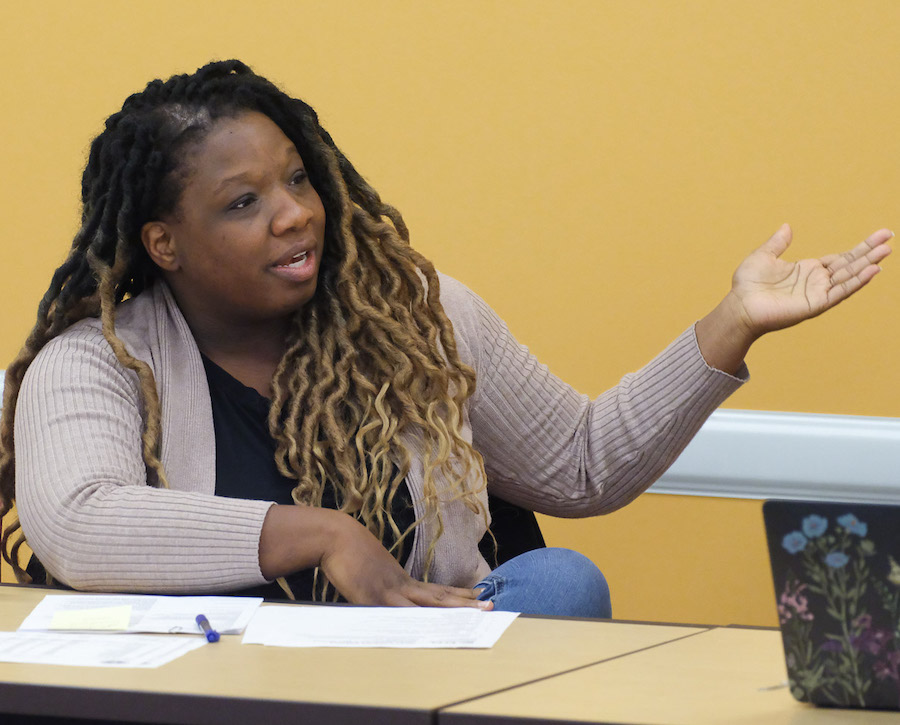East Lansing Library Seeks Outside Help as Youth Behavior Issues Persist: Mental Health and Security Solutions Proposed
Frustrated by ongoing youth behavioral problems at the East Lansing Public Library, ELPL staff are looking to outside sources for help.
“It is an unfair ask of our staff to be the only problem solvers in the room,” Interim Library Director Chrissie Evaskis-Garrett said.
The library has become a default space for students to kill time after school, and board members are concerned that this undermines the purpose of the library. At the Wednesday, Aug. 20 Library Board of Trustees meeting, the board declared a need for support.
“The students are not coming to the library to be there,” Board President Ameenah Asante said. “They’re coming because they have no place to go. We’ve seen this for a couple of years, and we’re trying to solve a constantly moving target when the bigger conversation needs to happen.”

At the meeting, two presentations outlining potential remedies for the library’s ongoing behavioral issues were given to the board.
Women’s center director proposes using mental health specialists to address issues.
The Women’s Center of Greater Lansing and Resolution Services Center of Central Michigan (RSCCM) proposed a solution that they believe would reduce behavioral incidents by 70% by the end of the upcoming school year, women’s center Executive Director Rebecca Kasen said at the meeting.
“We’d like for the number to be 0, but we know that kids are still kids and there are other issues.”
Their proposal mirrors an Arizona library’s approach to handling incidents involving youth by implementing restorative justice practices.
The women’s center would place a licensed therapist, and RSCCM would place a restorative justice specialist in the library every school day from 3-6 p.m.
Generally, the restorative justice specialist would be at the library to immediately respond to the start of a problem before potential escalation. The therapist would provide mental health presentations and individual therapy with parent permission, Kasen explained.
Kasen said former Library Director Kevin King told her that there are 12-15 “ringleaders” of the group causing problems. She thinks that using specialists to address bad behavior can solve the library’s problems without harming children who are still developing.

To further support the kids, the proposal includes a leadership training class, which Kasen explained would be a group that meets once weekly with the therapist to help encourage the kids to focus their leadership skills for good.
Participation in the new program would require parental permission.
“We want the parent permission slip for two reasons: you don’t involve children without their parents’ consent, and we want parent buy-in. We are there to support the kids, not call the cops, or do any punitive things,” Kasen said.. “We are here to shape the next generation of leaders.”
Kasen is still looking for a funding source for her program.
“I’ve been applying to grants since May, and the systems are overrun. The one grant I’m most hopeful for won’t decide until November,” Kasen said. “I talked to Councilmember [Dana] Watson, and she said the school district, library and City Council are already allocating funds directly or indirectly to resolving this issue.”
Previously, Kasen said the cost of the program would be about $105,000. She recommended reallocating funds from the library, school and city to get the program started, since this is a timely issue. If the women’s center finds a grant to fund the program, it would shift over to that revenue stream.
Trustee Amy Zaagman, Asante and Evaskis-Garrett noted at the end of Kasen’s presentation that they’d like to see how the women’s center can work with the library staff who have been tackling this issue for a while now.
Library board hears from security company about potential fixes.
Building on the theme of safety, Director of Operations at Teachout Security Solutions Derek Loomis was invited to talk to the board about the possibility of adding security to the library.
Teachout uses a de-escalation model for reducing incidents of violence. Additionally, they offer service training that would be available to library staff, including CPR and Narcan training.
Loomis noted that libraries have specific security needs. He said Teachout has employees in some libraries who are dressed similarly to police officers that monitor access points.
Teachout’s main goal is to watch for suspicious behaviors and violations of the patron code of conduct.
Teachout currently serves Bay City, Saginaw, Kalamazoo, Battle Creek and Dearborn Heights Public Libraries, Loomis said.
Loomis shared de-escalation tactics with the board, and explained how Teachout has responded to different issues. He also said that the best form of de-escalation is proactive.
“The best de-escalation is the kind you don’t have to do,” Loomis said. “If you can have a great rapport with the people coming into the library and [can] be positively engaged with them all the time, but you have a little bit of deterrence. Knowing you have a security officer in the building goes a long way.”
Evaskis-Garrett shared that Teachout worked at Jackson District Library, a library she previously worked at.
“I only had positive interaction with the team there,” she said.
Before moving forward with any proposal, the library board plans to meet with both the school board and the City Council.
“Creating a de facto teen center out of the library because they don’t have anywhere else to go is unfair for the community to continue to expect library staff, and for the library to serve that purpose,” Zaagman said. “We need to get the leadership of the City Council, the library, and the school board in a room and say it’s a collective issue. It’s unfair for us to continue to be put in the situation where we’re constantly trying to rework library plans and programming.”

